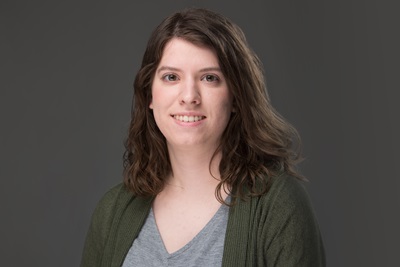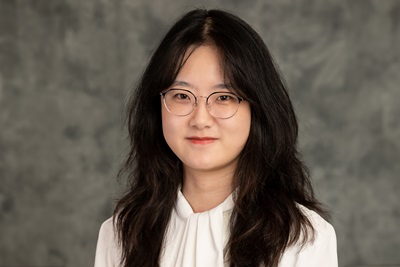.jpg?h=675&w=1200)
The Buffett Early Childhood Institute is investing in the next generation of early childhood researchers.
Through its Graduate Scholars program, the Buffett Early Childhood Institute provides funding to University of Nebraska doctoral students who are working on innovative projects related to early childhood education and development. Each year, up to four students receive one-year fellowships worth up to $25,000 each.
Since 2016, the Buffett Institute has funded 27 Graduate Scholars to the tune of nearly $700,000. The benefits aren’t just monetary—the program offers students the opportunity to network with and learn from Institute experts and leaders across the early childhood field.
These students further the university’s research priorities by engaging in in-depth explorations of vital early childhood issues, including childhood allergies, the development of early math skills, microplastics in baby food and products, and depression and anxiety in mothers of premature babies.
Ph.D. students within the University of Nebraska System can now apply for the next round of Graduate Scholars funding. Applications are due March 31.
Learn more about the program, eligibility requirements, and how to apply.
The Institute’s 2024-25 Graduate Scholars—Matt Brooks, Kaitlin Fraser, and Weiman Xu—answered questions about the potential impacts of their projects and how the Graduate Scholars program has helped them conduct meaningful research that affects children and families.
These interviews have been lightly edited for length and clarity.

Matt Brooks, Department of Educational Psychology at the University of Nebraska-Lincoln
Q: Tell us about your research project and its intended impact.
A: My research project was designed to explore how the "connecting children to nature" recommendations of the Nebraska Early Learning Guidelines are used across the state. I'd like to understand what practitioners are doing to connect children to nature, why they choose to do this, and the barriers to or successes they are seeing with this work. Going further, I'm hoping to investigate how these practices of connecting with nature might positively impact practitioner stress. My hope is that the work can lay the foundation for building momentum in promoting nature-based activities, continuing a legacy of long-running efforts to legitimize them as not just a healthy development tool for young children, but as a healthy support for educators as well.
Q: What inspired your interest in this topic?
A: My own experience with burnout informed my work as did my healing through experiences with nature. The struggles of the COVID-19 pandemic made so clear to me the importance of re-awakening our engagement with the natural environment. As a bonus, my research exposed me to all the ways we are learning nature benefits us, highlighting a responsibility I think we have to reciprocate this gift to our children and the earth itself. A critical influence for me was reading Robin Wall Kimmerer's “Braiding Sweetgrass”; it sang to me at the perfect time. Right plant, right place, I guess.
Q: How has the Graduate Scholars program benefited you?
A: Beyond the financial benefit of the program and the flexibility that it provides my efforts, the Graduate Scholars fellowship has quite literally put me in the room with some of the folks I think are doing brilliant work to support early childhood efforts statewide and who were my own inspiration, including the Buffett Institute’s Alex Daro, director of applied research, Mary Beth Pistillo, early childhood specialist, and Walter Gilliam, executive director.

Kaitlin Fraser, Department of Biomechanics at the University of Nebraska at Omaha
Q: Tell us about your research project and its intended impact.
A: My project focuses on how we can get nonverbal information from children when we provide them with an upper limb prosthetic. Much of our current fitting process relies on surveys and questionnaires, but we want to understand how we can get more direct insight into how children use their prosthetics so we can improve our processes for fitting them and designing them.
Q: What inspired your interest in this topic?
A: Most children who were born without portions of their hands or arms choose not to use prosthetics when they have access to them. However, most current guidelines recommend fitting children with prosthetics from infancy so pain from future compensatory movements can be avoided. By talking to the children we have served over the past six years and their families, we want to improve how we can get measurable feedback from the children over very complex ideas. Usage rates of prosthetics have stayed stagnant over the past 40 years so we want to see if body language can provide direct feedback about abstract concepts.
Q: How has the Graduate Scholars program benefited you?
A: As this program is helping me get my Ph.D., having a community of people who understand how the early years can have lasting ramifications throughout a child’s lifetime is meaningful. Seeing the work my fellow Scholars are doing is really exciting because all of us care about setting up young children for success.

Weiman Xu, Department of Child, Youth and Family Studies at UNL
Q: Tell us about your research project and its intended impact.
A: My interest in this topic stems from a desire to understand how intergenerational coparenting dynamics influence children's social-emotional development, particularly in the context of changing family structures in China. With grandparental involvement in child-rearing becoming increasingly common, I want to explore whether these relationships serve as a protective factor or a source of conflict that children may internalize. Given the limited research in this area, my goal is to contribute new insights that can inform both academic understanding and practical strategies for fostering healthier family relationships.
Q. What inspired your interest in this topic?
A: My interest in this topic stems from a desire to understand how intergenerational coparenting dynamics influence children's social-emotional development, particularly in the context of changing family structures in China. With grandparental involvement in child-rearing becoming increasingly common, I want to explore whether these relationships serve as a protective factor or a source of conflict that children may internalize. Given the limited research in this area, my goal is to contribute new insights that can inform both academic understanding and practical strategies for fostering healthier family relationships.
Q: How has the Graduate Scholars program benefited you?
A: The Graduate Scholars program has provided crucial funding that supported my data collection and allowed me to present my research at conferences, expanding the impact of my work. Beyond financial support, the program gave me the opportunity to engage with scholars from diverse backgrounds, receiving valuable feedback from researchers both within and beyond the Buffett Institute. These experiences have strengthened my research and helped me build connections that will shape my future scholarship.

